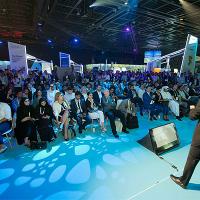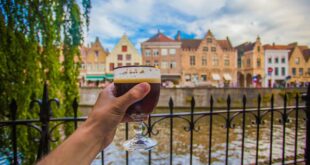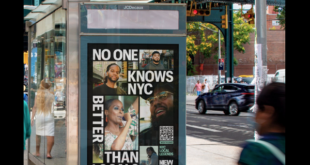[ad_1]
DUBAI, UNITED ARAB EMIRATES – Dubai’s economy continues to experience sustained growth from the contribution of business tourism, thereby driving the nation’s economic diversification agenda prioritised in the UAE Centennial 2071 strategy. As such, the Dubai World Trade Centre’s (DWTC) portfolio of businesses and the activities enabled by events hosted, organised and delivered at the venue, generate high returns for ancillary industries across the MICE ecosystem, while continuing to serve as an economic catalyst for the country. The company’s latest Economic Impact Assessment report for 2018 saw a record AED 13.1 billion, equivalent to 3.3% of the emirate’s Gross Domestic Product (GDP), added in incremental retained economic value by DWTC. The study estimated the total corresponding gross output of these activities at AED 23 billion, resulting in a high 57% locally retained impact – marking a 3% increase over 2017.
Analysing the factors underlying DWTC’s growing contribution to the city’s GDP acceleration agenda, the report highlighted the success of the venue’s 97 large-scale exhibitions, trade events, conventions and conferences hosted through 2018, that attracted over 2.5 million event attendees, with over 1 million international visitors, reflecting the sustained return on investment (ROI) being delivered consistently for global participants. Insights further illustrated how the organisation has successfully aligned its portfolio strategy, medium and long-term investment, calendar diversification, content enrichment and visitor experience delivery programmes to effectively support the ambitious goals set out in the UAE’s Vision 2021.
“2018 was a particularly noteworthy year that marked four decades of our accelerated journey towards accomplishing the aspirational mandate laid out by His Highness Sheikh Mohammed bin Rashid Al Maktoum, Vice President and Prime Minister of the UAE and Ruler of Dubai, to make the emirate the global hub for regional business networking. Our investments and strategic efforts over this period are aimed at furthering DWTC’s role as a pioneering MICE platform, optimally positioned to connect developed economies with high-growth emerging markets across continents. Consequently, thanks to the incredible and consistent support we have received from our leadership, we have been able to sustainably unlock and elevate the MICE sector’s contribution to both, the UAE’s economic diversification agenda, and Dubai’s GDP in line with the Dubai Plan 2021. Looking ahead at 2020 and beyond, DWTC seeks to build on this strong business portfolio, as we pursue the vision to incrementally aid the development of a knowledge economy and self-sustaining entrepreneurial ecosystem,” said His Excellency Helal Saeed Almarri, Director General, Dubai World Trade Centre Authority and Dubai Department of Tourism and Commerce Marketing.
His Excellency Almarri continued: “Large-scale events held in the city are critical drivers of GDP acceleration and have contributed positively to the economy year-on year. Our role, as a leading global platform for business events across the EMEASA region, has us ably support Dubai and the UAE in the diversification and sustainable growth agenda. This 2018 Economic Impact Assessment white paper sheds light on DWTC’s approach and proven ability to unlock ecosystem-wide economic value, creating even more critical wider socio-economic impact, ultimately spurring business expansion investment and leadership for Dubai as the world’s #1 hub for international business.”
The study, designed to provide data-backed intelligence on the impact of Dubai’s MICE sector to the city’s economy, analyses the performance of large-scale events, which are defined as those that host over 2,000 participants, and their contribution to the city’s economy, its growth and development. Four key metrics have been assessed: total spend at MICE events; other ‘direct’ spends in related sectors such as – hotels and restaurants, retail and recreation, air and ground transport, government, business services etc. – in addition to ‘indirect’ spends related to necessary production increases to meet increased demand; and the ‘induced’ value that results from higher employment and earnings.
Ancillary sectors in Dubai’s economy benefiting from MICE events
The study attributed the record AED 13.1 billion in retained economic value for Dubai’s largely import-based economy to the performance of DWTC’s large-scale events, estimating that for every AED 1 (unit dirham) spent at these events, a further 4.4 times in sales value was generated for ancillary sectors and Dubai’s wider economy. Overall, Dubai’s MICE sector enabled AED 16.3 billion of direct economic output in 2018 – marking a 2% increase over 2017, driven by the surge in demand for goods and services. The nation’s leadership has consistently reiterated the significance of a burgeoning MICE sector, indicating that its success largely supports wider industries. Apart from direct revenue generated, the industry enables repeat visitation, industry progression through knowledge sharing, and inward investment into the economy.
International traffic driving higher growth
Europe accounted for the highest number of international business event visitors (25%), followed by the GCC (21%), and the MENA region (17%). The top 10 source markets – the Kingdom of Saudi Arabia, India, Oman, China, Egypt, Turkey, the United Kingdom, Germany, Italy and Kuwait – all lie within an eight-hour flight path from Dubai, highlighting the city’s growing significance as a premier business destination at the crossroads between the East and the West.
International attendees to DWTC large-scale events constitute 41% of total participants, yet they account for 79% (AED 12.9 billion) of the overall direct spend. On the contrary, domestic participants accounted for 59% of the total attendance and were responsible for 21% of direct spend (AED 3.4 billion). The higher spend per event by international participants is approximately seven times higher in comparison to locally-based attendees (AED 7,375 vs. AED 1,099), attributable to the increase in length of stay of international visitors and companion accompanied travel. On average, the duration of stay for international participants was 5.5 days in 2018, up on the 5-day figure for 2017, while the number of companion travellers has also risen by 76% over 2017.
“Dubai’s evolution as a leading MICE destination has undeniably helped shape its reputation as a global hub for the international business community, and DWTC has been a pioneering leader in this journey. The momentum achieved to-date through the past four decades since our inception, positions us strongly as we progress towards 2020, laying the foundations to realise the vision and strategy of our city’s leadership – to drive further investment across sectors into Dubai’s and the nation’s economy,” added His Excellency Almarri.
National diversification agenda in action as key sectors dominate
Five key industry sectors dominated in 2018 – Food, Hotel and Catering; Healthcare, Medical and Science; Information Technology (IT), Business and Finance; Energy and Environment; and Industrial Manufacturing – accounting for 66% (AED 8.6 billion) of the Gross Value Added (GVA) to Dubai’s economy. This not only indicates the success of the UAE’s National Innovation Strategy in guiding the nation’s economic diversification efforts, but also demonstrates the strength of DWTC’s dynamic portfolio. The stellar performance of MICE events hosted within these industries, have also largely supported in making the UAE’s economy more competitive and resilient to global headwinds. The report estimates that these five sectors attracted 62% (1.6 million) of all attendees to DWTC’s 97 large-scale events in 2018, with 66% of all international participants similarly being drawn from the same sectors, thereby building on Dubai’s reputation as an attractive destination as well as one that is primed for business and conducive to foreign investment.
Food, Hotel and Catering remained the top performing sector with 46% international participation and AED 2.7 billion in GVA representing a 41% growth over 2017; followed by the Healthcare, Medical and Science sector with 49% international participation at 18 events which contributed AED 2.5 billion in GVA, marking a 7% increase since 2017. The IT, Business and Finance sector contributed AED 1.7 billion in GVA – a 75% increase over 2017 – with 32% international attendance; followed by the Energy and Environment sector which saw 48% of international participation with AED 900 million in GVA. Of all five sectors, Industrial Manufacturing witnessed the fastest growth in contribution with AED 800 million of GVA, doubling its 2017 figure while attracting 50% in international attendance.
“DWTC’s robust portfolio and content-enriched calendar has evolved tremendously to feature innovative business events spanning the key priority verticals outlined in the UAE National Innovation Strategy. Through our diversification strategy and the development of increasingly bold methods to host large-scale events, we have leveraged Dubai’s strategic positioning as an international hub for business and trade enablement. This has allowed us to effectively attract higher volumes of international business visitors, which in turn has had a positive impact on Dubai’s GDP,” said His Excellency Almarri.
Enabling wider socio-economic growth and positive impact to domestic households
The National Agenda 2021 places immense significance on transforming the UAE into a competitive tourism and commercial hub, achieved by transitioning into a knowledge-based economy with emphasis on efforts to deliver widespread socio-economic development for the nation. According to the Economic Impact report, a total of 87,861 jobs were attributable to DWTC’s business events sector in 2018, and generated an aggregate AED 4.2 billion in disposable household income, demonstrating that high value adding sectors, like Dubai’s MICE industry, play a crucial role in crafting a knowledge and skills economy, but also in contributing to the nation’s wider goal of becoming among the top countries in the world with regard to income per capita. An estimated 71% of these employment opportunities were a direct result of the demand generated within the MICE and adjacent sectors. The remaining 29% is attributable to the wider domestic economy as a result of the “indirect” and “induced” employment impact.
In conclusion, His Excellency Almarri focused on the way forward: “His Highness Sheikh Mohammed bin Rashid Al Maktoum, Vice President and Prime Minister of the UAE and Ruler of Dubai, has articulated a clear strategic directive to exponentially drive the city to be 10 years ahead of any global competition across sectors. This imperative has integrally influenced our future proofing focus – on customer experience elevation, and even broader economic value creation – both of which are evidenced in our successful prioritisation so far of delivering high volumes of international participation from across the world to business events in Dubai.
The data from the Economic Impact Report confirms that international business traffic to events has continuously proven to be significant in driving economic development. The impact goes far beyond the economy, extending to residents, trade professionals and businesses alike. With the growing spotlight on Dubai for its superior business and trade ecosystems, our focus remains on further enhancing our offering of events to continue to attract multi-sector business visitors, with a view to enable future GDP acceleration.”
[ad_2]You can read more of the news on source
 Travelsmart
Travelsmart



